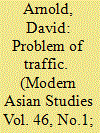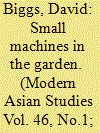|
|
|
Sort Order |
|
|
|
Items / Page
|
|
|
|
|
|
|
| Srl | Item |
| 1 |
ID:
157089


|
|
|
|
|
| Summary/Abstract |
In Nagaland, state attempts to control coal mining are framed as efforts to stop practices labelled ‘unscientific’ by the government. In this article we explore the ways in which communities create their own mining infrastructure built on networks of relations—materialised in English-language documents—and everyday technology—demonstrated in the prevalence of old trucks and improvised machinery. These objects enable livelihoods and supplementary incomes in this region. At the same time, they are also ways of challenging state attempts to control natural resources and for tribal communities to make claims on territory. We focus on coal mining infrastructure, technology and territorial claims in a frontier described variously as remote, inaccessible and underdeveloped, and explore the ways in which practices considered ‘unscientific’ endure and undergird an alternative system of community natural resource management and exploitation.
|
|
|
|
|
|
|
|
|
|
|
|
|
|
|
|
| 2 |
ID:
118895


|
|
|
|
|
| Publication |
2012.
|
| Summary/Abstract |
That technology matters-and matters profoundly-to the humanities and social sciences is no longer in dispute. But exactly how it informs our understanding of society, now and in the past, remains a matter of scholarly contention. It might be argued that, as the history and sociology of technology moves away from its principal point of origin in the study of Euro-American societies, the questions that technology poses have, if only by virtue of their relative novelty, a particular resonance for the constituent regions of modern Asia-and not least for the societies of South and Southeast Asia that form the subject of this special issue. It is not a question of adopting an approach as unsubtle and outmoded as technological determinism, or of simply extending to one corner of the Asian landmass a set of 'global' theories and histories, with technology as their underpinning, already established and familiar in other contexts. Rather, it is a case of finding and developing a perspective on technology which helps to illuminate the inner histories and local narratives of these regions and which brings to the wider discussion of technology something distinctive, distilled from the outlook and experience of one part of the non-Western world. A desire to move beyond scholarship's still-dominant paradigms of colonialism, nationalism, and development, to explore the multivalent nature of 'everyday life' and enquire into 'the social life of things' as locally constituted, to examine modernity's diverse material forms, technological manifestations, and ideological configurations, to locate the regional roots as well as the exogenous origins of social change and cultural transformation, to situate subaltern experience alongside middle class mores and elite appropriation-all these interlocking considerations have begun to form part of a collective inquiry into the technological histories and cultures of South and Southeast Asia. A scholarly search is clearly under way to establish new methodologies and meanings, new contexts, and conjunctures, which will inform and reinvigorate the history, sociology, anthropology, and geography of these regions and redefine their place within the burgeoning field of science and technology studies.
|
|
|
|
|
|
|
|
|
|
|
|
|
|
|
|
| 3 |
ID:
118900


|
|
|
|
|
| Publication |
2012.
|
| Summary/Abstract |
In India in the early twentieth century the modern socio-technological phenomenon of traffic brought together many visible and accessible forms of everyday technology. However, in India modern motorized transport had to operate alongside earlier, seemingly 'pre-modern', modes of street-life. The emergence of traffic helped foster the expansion of late-colonial policing and the growth of the 'everyday state'. It stimulated a new sense of a middle class identity and the proper ordering and disciplining of those who used the modern highway. But the technology of traffic was also contested-by those who evaded traffic rules as well as by those who were critical of technological modernity or the rising human cost of traffic accidents. The street at times became a site of open opposition to state authority or, through the deliberate disruption of traffic, a significant location for the exercise of political defiance and control.
|
|
|
|
|
|
|
|
|
|
|
|
|
|
|
|
| 4 |
ID:
118896


|
|
|
|
|
| Publication |
2012.
|
| Summary/Abstract |
This paper examines the relationship between rubber plantations and changes in everyday technologies in rural Indochina. It also explores the effects that improvement projects had on the countryside in which those who were targeted by these programmes lived. Speeches given at the opening of the B?n Cát agricultural school in Th? D?u M?t province in 1918, for example, show that this school was designed both to train Vietnamese assistants to work on large agricultural exploitations and to improve native agricultural practices. Officials used journals, such as the bilingual French-Vietnamese Cochinchine Agricole, which appeared between 1927 and 1930, to popularize latex-producing science and techniques. Though their motivations often differed from those of officials, the Vietnamese elite, ranging from those in the anti-colonial Duy Tân H?i (Modernisation Society) to French-trained physicians, scientists, and engineers, also often sought to address the problems of rural southern Vietnam through improvements in everyday agricultural technologies. This paper suggests that plantation agriculture, which structured the everyday meanings of rubber in Vietnam, along with the failures of native improvement, began to weaken the support of the Vietnamese elite for the colonial regime during the 1930s. Uneasy compromises and contradictions meant that neither economic profit nor social improvement alone existed in the rubber-producing industry.
|
|
|
|
|
|
|
|
|
|
|
|
|
|
|
|
| 5 |
ID:
118897


|
|
|
|
|
| Publication |
2012.
|
| Summary/Abstract |
Twentieth-century industrialization in the agricultural landscapes of the Mekong Delta in Vietnam took a very different form from other places, characterized less by a continuous spread of large-scale technology than by its destruction in mid-century and the subsequent spread of small technology which powered scooters, water pumps, and boats. The numbers of these portable motors, an everyday technology in 1960, rose from a few thousand units in 1963 to millions in the present day. The colonial and post-colonial state in Vietnam played a key role in the demise of large technology and, ultimately, of the water infrastructure. Its failures during wartime spurred farmers to adopt cheap, small engines to survive; however, the state's role was complex during this time. Several key factors, including the influence of American aid programmes and the contributions of Taiwanese agricultural advisers, especially those pushing high-yield rice, favoured the adoption of small engines. From an ecological viewpoint, the post-1960 explosion in the use of small motors, especially as water pumps, has brought people and states in Southeast Asia to an ecological impasse as unrestricted use has impacted on water tables, salinity levels, and the long-term sustainability of agriculture in many places. This paper examines the state's indirect role in shaping this silent revolution, and it considers the political and ideological factors underpinning its history.
|
|
|
|
|
|
|
|
|
|
|
|
|
|
|
|
|
|
|
|
|